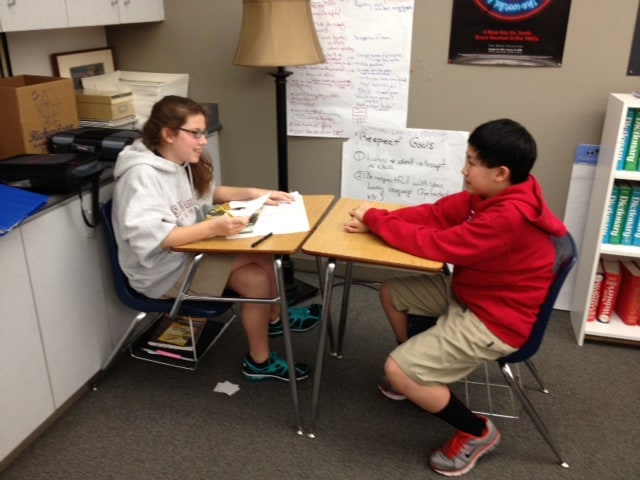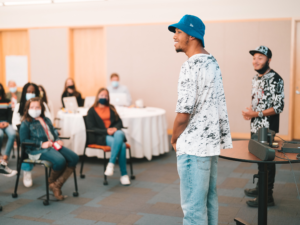Student CEOs Groom Change-Agents for the Classroom

 Last fall, I implemented Student Learning Teams in an effort to empower my fifth- and sixth-grade students as learners in my classroom. Fired up by Alan November’s notion of Digital Learning Farms and John Hunter’s World Peace Game, I offered my students the opportunity to do the real work of making class reading selections, collecting data about homework to make it more meaningful, and finding resources to enhance their understanding of Language Arts. Could Student Learning Teams, I posited, be the change-agents we needed to transform learning in my classroom?
Last fall, I implemented Student Learning Teams in an effort to empower my fifth- and sixth-grade students as learners in my classroom. Fired up by Alan November’s notion of Digital Learning Farms and John Hunter’s World Peace Game, I offered my students the opportunity to do the real work of making class reading selections, collecting data about homework to make it more meaningful, and finding resources to enhance their understanding of Language Arts. Could Student Learning Teams, I posited, be the change-agents we needed to transform learning in my classroom?
Then the Student Learning Teams stalled. Students didn’t understand their jobs. What were they supposed to do, they asked. They didn’t trust that I really would allow them to design elements of the curriculum. I was a teacher, so why would I do that? For the most part, they had no idea how to collaborate. How could they, when they had almost always been directed in what to do? Finally, they felt little sense of purpose or ownership in the project. After all, I had set everything up according to my own sense of how to design the course, according to my ideas of how they could contribute to the learning in the classroom. I hadn’t really consulted my students at all.
Regrouping, Reflecting, and Thinking Deeply
Encouraged to regroup with the students by John Hunter and others, I went back to the classroom and asked my students what we should do. Were the Student Learning Teams worthwhile or not? Well, maybe, but we needed to make some major changes. Together we watched Hunter’s TED talk, “Teaching the World Peace Game” and discussed why Hunter’s fourth-graders were so engaged, why they believed in what they were doing, and how they were learning because they wanted to learn. Why can’t we do that, they asked? Can we have prime ministers and get together to solve real problems?
Why, indeed. So we brainstormed the close-to-home problems of learning Language Arts. How could we make learning grammar and vocabulary more fun? How could we help those students who fell behind or had trouble with difficult concepts? How could we learn in a way that was more physically active? How could we make better use of media and technology to enhance learning for everyone?
We discussed the kind of attitude students would need to adopt to make the learning teams effective. We talked about the value of working hard, about failure, about feeling a sense of responsibility and commitment. We worked through some of the problems that were distracting them from true collaboration. We talked about the real jobs they would like to take on (game designer, mediator, and my favorite, teacher translator). We worked about a structure and rules of engagement. Our revised learning teams have now been launched.
CEOs and the Czarina of the Universe
My students now devote a full double period every six school days in our school’s rotating schedule to their team projects. They know they can ask for more time if their projects require it, as long as they are learning and it relates to Language Arts. I have created online spaces in Edublogs and Collaborize for them to report back to their peers, who will hold them accountable for their progress.
Following Hunter’s model, I appointed CEOs of teams, who then interviewed their classmates and reviewed their applications. CEOs presented vision statements for projects they wanted to implement and described the qualities and skills they needed. Student applicants wrote profiles of their dream jobs and described in detail their qualifications and experience.
CEOs understood that they were responsible for gathering the right talent on their teams and inspiring them to produce quality work that would improve learning in our class. Team members knew that they could be fired if they goofed off too much, though they could appeal to the Czarina of the Universe (yours truly) if they felt they had been dismissed unjustly. CEOs knew that they too could be replaced if their teams felt that they weren’t effective. This was starting to feel real.
Underway
Everyone took the interview process seriously. Students wrote thank you notes to the CEOs after their interviews. CEOs reviewed student profiles to make their selections. I was a little worried about how the students would handle the next stage of the process, but was soon pleasantly surprised when in my first class, the CEOs asked for a private meeting to discuss their team selections. Because they were focused on finding the best talent for their projects, they worked together to sort out the teams, even solving problems of who could best motivate their less academically-minded classmates. This process, to my amazement, repeated itself with every class.
Now the students have held and reported on their first meetings. Here are their projects thus far:
- Building a website or wiki to provide tutoring help and resources;
- Creating a series of videos to instruct students more formal speech and writing;
- Building an app to help students learn more easily and frequently;
- Developing learning games that incorporate more physical activity;
- Contributing weekly discussion questions to the curriculum.
- Creating a weekly classroom newspaper;
- Creating videos, games, and songs to help students learn grammar and vocabulary;
- Creating a video newsletter based on passages and puzzlers from our reading;
- Designing their own fun class projects.
Student Learning Teams and Language Arts
National Council of Teachers of English, joining forces with Partnership for 21st Century Learning in 2008 (yes, half a decade ago), recommended these skills for 21st Century learners: creativity and innovation, critical thinking and problem solving, communication, collaboration, information literacy, and media literacy (see Katie Ash’s article for Education Week, Dec. 23, 2008). I would add the following skills as critical to any student’s success: meta-cognitive skills in reflection and learning how to learn; social-personal skills in empathy, responsibility, accountability, and perseverance. In addition, I believe a new skill has emerged as a priority as we have all moved into digital age: transparency.
All of these skills are addressed by my students’ work in learning teams. Already they have taken on real-life communications (orally and in writing) by writing profiles and interviewing for team selection. They have stepped up to solve real problems, thinking fast on their feet in their interviews, forming their teams and defining the scope of their projects, and finding a purpose for their work together. They have reported on their meetings and developing ideas. They are starting to create and design “branding” materials for their teams (I finally figured out what to do with all the lanyards and badges from all the conferences I have attended over the years.)
Although we are just beginning, my students are positioning themselves to innovate new ways of approaching language arts learning in the middle grades. They will create and produce actual movies, web pages, and other curricular materials to address the concerns they have identified together. They will work together to solve the problems that are closest to their every-day lives – the way they learn in school. They will help one another become better learners in the long run.
In addition, they are being held accountable by their teams and their peers in a transparent way by reporting and documenting their progress. They don’t know it yet, but they will build their information literacy skills by finding, reviewing, and sharing resources. They will also evaluate the best tools for communicating and sharing their learning with others.
Perhaps most importantly, my students have learned to persevere and learn from failed attempts, they have reflected openly about their learning, orally and in writing, and they are opening their eyes to exploring new ways to learn on their own. In the process, they are employing empathy and showing true understanding of their peers, and they are modeling the kind of commitment and responsibility we hope to find in adults.
I’m excited. My student CEOs and their Student Learning Teams may be poised to become the change-agents we need to transform the way learning happens in school.







0 Comments
Leave a Comment
Your email address will not be published. All fields are required.